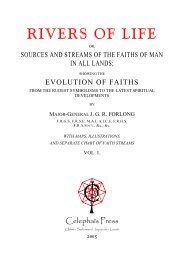Dutch Fairy Tales by William Elliot Griffis.pdf
Dutch Fairy Tales by William Elliot Griffis.pdf
Dutch Fairy Tales by William Elliot Griffis.pdf
Create successful ePaper yourself
Turn your PDF publications into a flip-book with our unique Google optimized e-Paper software.
<strong>Dutch</strong> <strong>Fairy</strong> <strong>Tales</strong> for Young Folks<br />
The oxen were so strong that they could pull logs of wood or draw a plough. So, little <strong>by</strong> little, the forests<br />
were cut down and grassy meadows, full of bright colored flowers, took their place. Houses were built and the<br />
people were rich and happy.<br />
Yet there were still many cruel men and bad people in the land. Sometimes, too, floods came and drowned the<br />
cattle and covered the fields with sand, or salt water. In such times, food was very scarce. Thus it happened<br />
that not all the babies born could live, or every little child be fed. The ba<strong>by</strong> girls especially were often left to<br />
die, because war was common and only boys, that grew into strong warriors, were wanted.<br />
It grew to be a custom that families would hold a council and decide whether the ba<strong>by</strong> should be raised or not.<br />
But if any one should give the infant even a tiny drop of milk, or food of any kind, it was allowed to live and<br />
grow up. If no one gave it milk or honey, it died. No matter how much a mother might love her ba<strong>by</strong>, she was<br />
not allowed to put milk to its lips, if the grandmother or elders forbade it. The young bride, coming into her<br />
husband's home, always had to obey his mother, for she was now as a daughter and one of the family. All<br />
lived together in one house, and the grandmother ruled all the women and girls that were under one roof.<br />
This was the way of the world, when our ancestors were pagans, and not always as kind to little babies as our<br />
own mothers and fathers are now. Many times was the old grandmother angry, when her son had taken a wife<br />
and a girl was born. If the old woman expected a grandson, who should grow up and be a fighter, with sword<br />
and spear, and it turned out to be a girl, she was mad as fire. Often the pretty bride, brought into the house,<br />
had a hard time of it, with her husband's mother, if she did not in time have a ba<strong>by</strong> boy. In those days a<br />
“Herman,” a “War Man” and “German” were one and the same word.<br />
Now when the good missionaries came into Friesland, one of the first of the families to receive the gospel was<br />
one named Altfrid. With his bride, who also became a Christian, Altfrid helped the missionary to build a<br />
church. By and <strong>by</strong>, a sweet little ba<strong>by</strong> was born in the family and the parents were very happy. They loved the<br />
little thing sent from God, as fathers and mothers love their children now.<br />
But when some one went and told the pagan grandmother that the new ba<strong>by</strong> was a girl instead of a boy, the<br />
old woman flew into a rage and would have gone at once to get hold of the ba<strong>by</strong> and put it to death. Her<br />
lameness, however, made her move slowly, and she could not find her crutch; for the midwife, who knew the<br />
bad temper of the grandmother, had purposely hid it. The old woman was angry, because she did not want any<br />
more females in the big house, where she thought there were already too many mouths to fill. Food was hard<br />
to get, and there were not enough war men to defend the tribe. She meant to get the new ba<strong>by</strong> and throw it to<br />
the wolves. The old grandmother was a pagan and still worshipped the cruel gods that loved fighting. She<br />
hated the new religion, because it taught gentleness and peace.<br />
But the midwife, who was a neighbor, feared that the old woman was malicious and she had hid her crutch.<br />
This she did, so that if the ba<strong>by</strong> was a girl, she could save its life. The midwife was a good woman, who had<br />
been taught that the Great Creator loves little girls as well as boys.<br />
So when the midwife heard the grandmother storm and rave, while hunting for her crutch, she ran first to the<br />
honey jar, dipped her forefinger in it and put some drops of honey on the ba<strong>by</strong>'s tongue. Then she passed it out<br />
the window to some women friends, who were waiting outside. She knew the law, that if a child tasted food, it<br />
must be allowed to live.<br />
The kind women took the ba<strong>by</strong> to their home and fed it carefully. A hole was drilled in the small end of a<br />
cow's horn and the warm milk, fresh from the cow, was allowed to fall, drop <strong>by</strong> drop, into the ba<strong>by</strong>'s mouth.<br />
In a few days the little one was able to suck its breakfast slowly out of the horn, while one of the girls held it.<br />
So the ba<strong>by</strong> grew bigger every day. All the time it was carefully hidden.<br />
THE CAT AND THE CRADLE 11






![[PDF] Prolegomena](https://img.yumpu.com/16774951/1/190x245/pdf-prolegomena.jpg?quality=85)









